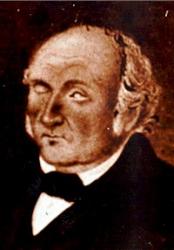1686 - 1745 Author of "Let not your hearts with anxious thoughts" in The Presbyterian Book of Praise Robertson, William, was the son of David Robertson of Brunton in Fife. After finishing his University course he was licensed to preach in 1711. He is said to have been assistant to the minister of the Presbyterian Church of London Wall, London, before his settlement, in 1714, as parish minister of Borthwick, Midlothian. In 1733 he was appointed minister of Lady Yesters, Edinburgh, and in 1736 of Old Greyfriars, and died at Edinburgh, Nov. 16, 1745. He was in 1742 appointed a member of the Committee of the General Assembly of the Church of Scotland, which compiled the Translations and Paraphrases of 1745, and is said to have contributed 3 paraphrases which, in the 1781 collection, are numbered 25, "How few receive with cordial faith" (p. 536, ii.), 42, "Let not your hearts with anxious thoughts" (p. 672, i.), and 43 "You now must hear my voice no more.” [Rev. James Mearns, M.A.]
--John Julian, Dictionary of Hymnology (1907)
William Robertson


 My Starred Hymns
My Starred Hymns




